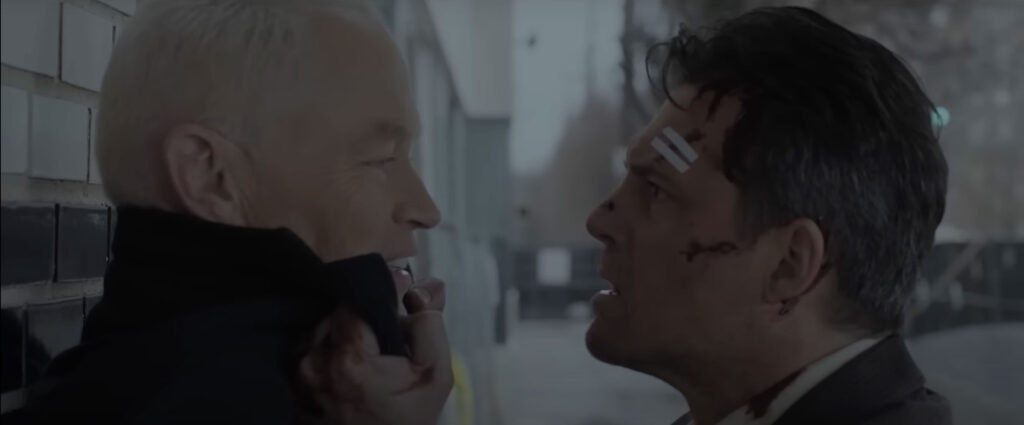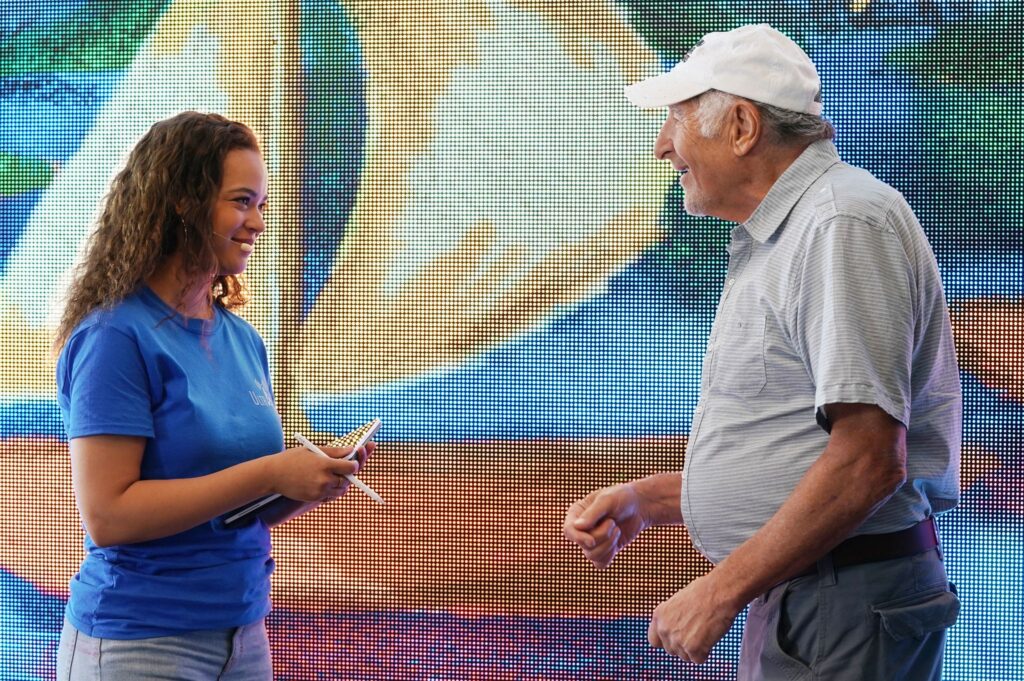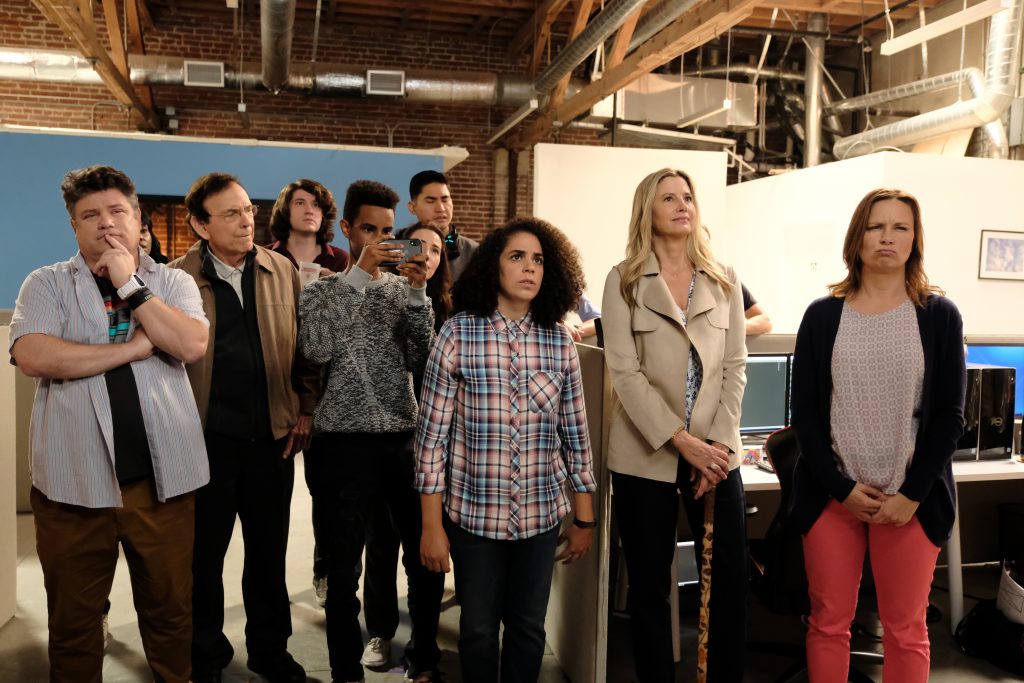April 19, 2024
by Carla Hay

Directed by R.J. Daniel Hanna
Culture Representation: Taking place in Colorado and Arizona, the dramatic film “Hard Miles” (based on true events) features a racially diverse cast of characters (white, African American and Latino) representing the working-class and middle-class.
Culture Clash: A social worker at a youth penitentiary for teenage boys recruits four of them to be on an informal bicycling team and leads them on a bicycling marathon from Denver to the Grand Canyon in Arizona.
Culture Audience: “Hard Miles” will appeal primarily to people who are fans of the movie’s headliners and well-acted movies about athletic challenges that test physical strength and result in personal growth.

“Hard Miles” is not going to be considered a classic movie about underestimated marathon bicyclists. However, this sentimental drama has good acting performances and an inspiring message that outweigh many of the corniest moments. Because the movie is based on true events, it makes the story much easier to take as an overall life observation, even though there are scenes that were obviously fabricated for the movie.
Directed by R.J. Daniel Hanna, “Hard Miles” was co-written by Hanna and Christian Sander. “Hard Miles” (which is a vague and bland title for this movie) had its world premiere at the 2023 Bentonville Film Festival. The outcome of the movie is entirely predictable, but the journey is watchable, even though it sometimes drags with repetition.
“Hard Miles” begins by showing social worker Greg Townsend (played by Matthew Modine) at a court hearing for one of the inmates at a youth penitentiary in Denver called Ridgeview Academy. (In real life, Greg Townsend worked at a youth penitentiary Ridge View Academy Charter School, in Watkins Colorado.) Greg, who works at Ridgeview Academy, is in this courtroom to advocate for leniency for a 16-year-old inmate named David Alvarez (played by Jesus Venegas), who’s in trouble for getting into a physical fight at Ridgeview.
Greg tells the magistrate (played by Jerry Boyd) that the fight would’ve been worse if David had not intervened to help stop the fight. The magistrate is not moved by Greg’s testimony and orders that David get transferred to another penitentiary, with six months added to his sentence. David is not seen or heard from again in the story.
This opening scene exists to show that Greg firmly believes in rehabilitation and reform with compassion but without coddling. It’s then shown early on in the film that Greg has a passion for marathon bicycling. One of his favorite marathons is the Tour de Grand, which is cycling to the Grand Canyon. (“Hard Miles” was actually filmed in California.)
A penitentiary social worker named Haddie (played by Cynthia Kaye McWilliams), who is one of Greg’s co-worker friends, jokes with Greg: “Only in this job would someone think that a 1,000-mile bike ride is a vacation.” Greg corrects Haddie by saying that the bike route from Denver to the Grand Canyon is actually 762 miles.
Greg does this type of verbal correction a few more times in the story, including to his co-worker friend Skip Bowman (played by Leslie David Baker), who is the manager at Ridgeview. Greg’s nitpickiness is an indication of what type of personality Greg has: He is enthusiastic about what he believes in, but he can also be self-righteous and stubborn. Greg can also get caught up in forcing his views on other people instead of really thinking about how they feel.
Flashbacks in the movie show that Greg had an unhappy childhood, when his father Scott Townsend physically and verbally abused Greg, who feels like he never really got his father’s approval. Greg has a younger brother named Doug. It’s implied that Doug probably got abused too, but Greg got the worse abuse from their father. The mother of Greg and Doug is not seen or mentioned in this story.
In these flashback scenes, Jaxon Goldenberg portrays childhood Greg, Judah Mackey has the role of childhood Doug, and Charles Ambrose depicts Scott as a young man. Ambrose also has the voice role of adult Doug, who is never seen on camera. Doug is incarcerated at a state prison in Sacramento, California, and he is only heard when he calls Greg from the prison.
In the present day of the story, Scott (played by Patrick Anthony Mullen) is now an elderly man with dementia and living in a hospice. Doug calls Greg to ask what Greg wants to do about visiting their father and making the necessary end-of-life arrangements. Greg (who is a bachelor with no children) has mixed feelings about it all. Greg is reluctant to visit his father and avoids returning calls from hospice workers who have already told Greg that his father Scott is very close to dying.
Meanwhile, Greg has something that ends up consuming his attention for most of the story: doing the Tour de Grand with four of the Ridgeview Academy residents. He teaches a machinist class, where he has four students: tough Atencio (played by Damien Diaz), brooding Rice (played by Zach Robbins), nerdy Smink (played by Jackson Kelly) and volatile Woolbright (played by Jahking Guillory), who is the most “antisocial” one in the group. Smink is the most mild-mannered and is unlikely to start a fight.
One day, Greg is inspired to bring four stationary bicycles to the class to share his interest in marathon biking with these students. Greg has a friend named Speedy (played by Sean Astin), who owns a bike shop. Greg convinces Speedy to donate professional bikes for the students to use.
Greg decides that these four students could all be on an informal Ridgeview cycling team that should do the Tour de Grant marathon with him. Greg chooses roles for each student on the team: Smink is the climber, Atencio is the puncher, Rice is the sprinter, while Woolbright (who is the only one reluctant to join the team) is assigned domestique duties, which is another way of saying it’s a rider who isn’t in the competition but is just there for support, such as carrying water bottles. Woolbright quickly changes his mind and joins the team because he doesn’t want to be a lowly “water boy.”
Greg also gets a company called Banda Di Cantene to sponsor the trip. And although Greg gets some skepticism from Heddie, Skip and some high-level bureaucrats in charge, Greg gets permission for this team to go on this trip by saying it’s part of inmate rehabilitation. This part of the story looks very “only in a movie” rushed and too easy for Greg. All of the movie’s performances are good, but Modine and Guillory are the obvious standouts in their roles as two people who seem to be complete opposites and clash with each other but find some common ground that changes each of them for the better.
“Hard Miles” wisely sticks to having just four people for Greg to lead on this marathon, in order for the movie to not be cluttered or confusing with too many characters. (It’s also a low-budget movie that probably couldn’t afford a large cast anyway.) However, very little is told about the young guys on the team, since most of the focus is on Greg being their role model.
Atencio opens up a little and says he was arrested for gang-related activities and that the gang he belongs to expects him to continue gangbanger crimes after Atencio is released from prison. Woolbright, who has a lot of anger issues, is serving his current penitentiary sentence because he was sent back to prison for driving without a license. The criminal records for Smink and Rice get little or no mention.
This team didn’t start out a friends. All of them have some type of conflict with each other before and durng the journey. Near the beginning of the movie, Atencio and Rice get into a physical brawl in a penintiary hallway. Haddie is nearby and accidentally gets injured in this fight. It results in Haddie having a sprained left foot and needing to use a walking boot and crutches. Inexplicably, despite these injuries, she volunteers to be the driver of the backup van that follows this biking team in case of an emergency.
As an example of how tone-deaf Greg can be, when he sees Haddie for the first time wearng her walking boot, he asks her in genuine surprise: “You don’t have to wear that?” She sarcastically replies, “No, it’s a fashion statement.” Although Greg and Haddie like and respect each other, they have very different opinions on many things.
In this very male-dominated movie, Haddie is the only woman who has a significant speaking role. Her character is written in a way that is baffling and sometimes annoying. She is often depicted as a nag who doesn’t add much to the story but getting into arguments with Greg over how he’s handling the marathon.
The movie never gives a believable explanation for why someone with a sprained foot and in need of crutches would want to driving a van for several hours a day, for weeks, for this grueling marathon. For a long stretch of the movie, Haddie does nothing but limp up to Greg and the team to scold Greg for pushing the team members too hard. And then, after being the Debbie Downer skeptic for most of the movie, Haddie suddenly has a cheerleader attitude at a certain point. This abrupt transformation looks very fabricated for a movie.
It’s revealed early on in “Hard Miles” that Smink (who is very skinny) actively has an eating disorder. This is another part of the “Hard Miles” that comes up short in crediblity. Why would Greg put someone with this serious health issue in a very risky health situation, where Greg pushes this team to the point where they vomit from exhaustion? Dehydration and heat stroke also major dangers, since the movie makes a big deal of showing how much desert territory is part of this marathon, which takes place during intense daytime heat.
Haddie likes to remind Greg that she has a college degree in psychology and Greg doesn’t, so Haddie thinks she’s the better person to know how to deal with Smink’s eating disorder. However, there’s no evidence that Greg or Haddie has any real medical training to deal with the risks of someone doing this type of marathon while in the throes of an eating disorder. There are a few scenes in the movie where Smink refuses to eat, which means he isn’t really in recovery. It seems medically irresponsible that Smink was approved to be in this marathon, no matter how much Smirk wanted to do this marathon of his own free will.
It’s perhaps the biggest failing of the movie not to address these health issues that are casually brought up and then sort of ignored when these health issues get in the way of the narrative that Greg is supposed to be the knight in cyclist uniform, determined to “save” these wayward young people. And as soon as Greg clutches his heart during a certain part of the marathon, you know what’s coming. But even that health scare is sort of glossed over in a way that looks very fake.
“Hard Miles” has the expected “push through the pain” pep talks and the predictable bickering among the team members. And it should come as no surprise that the person on the team who appears to be the “hardest” is the first one to have an emotional breakdown during the marathon. Greg also makes a decision about his father in one of the more poignant scenes in the movie. “Hard Miles” is not a movie to watch if you want a realistic and detailed look at the physical and health realities of doing this type of marathon. It’s a movie that works on the level of showcasing the belief in “mind over matter,” overcoming challenges, and surpassing expectations.
Blue Fox Entertainment released “Hard Miles” in select U.S. cinemas on April 19, 2024.








